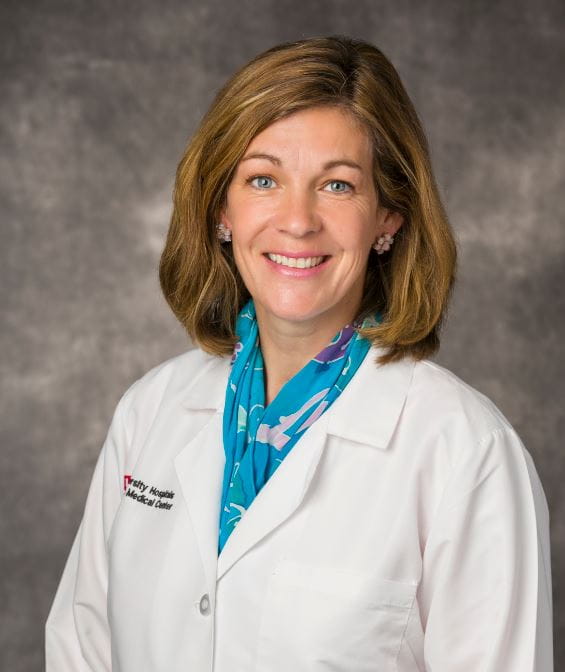Breast Cancer Best Practice
November 21, 2017
UH committed to convenience, support, oncoplastic approach for women with breast cancer
UH Clinical Update - November 2017
Patient experience is paramount for breast surgeon Jill Dietz, MD, Director of Breast Center Operations at University Hospitals.

”My job is to make sure the program is running smoothly so that people can get into all the disciplines quickly,” she says. “And patient experience is something I feel pretty passionate about.”
New patient experience initiatives at UH, Dr. Dietz says, are addressing the barriers women may have when obtaining a mammogram.
“We’re trying to figure out why only 65 percent of women get their mammogram when it should be 100 percent,” she says. “Maybe they’re too busy. If so, we want them to be able to get in and out in 15 or 20 minutes. Maybe they’re nervous and want their results that day. We now have same-day reads. If you want to wait 30 minutes, we can give you your results. Maybe the idea of getting an order from your primary care provider is preventing you from getting a mammogram. We’re eliminating the need for the order by having folks available who can write that order.”
A focus on convenience and reducing anxiety also extends to patients undergoing surgery for breast cancer, Dr. Dietz says. UH is the first health care provider in the region to move to the Sentimag and Magseed system for localizing the cancer pre-operatively. Unlike a wire placed the day of surgery, which can take several hours and make the patient even more anxious, a Magseed can be inserted under image guidance up to 30 days before surgery, perhaps during the patient’s consultation with the surgeon or when she comes for a patient education visit. Then during surgery, the Magseed and the cancer it marks can be detected by a metal-detector-like wand that gives audio feedback.
“It has a lot of benefits,” Dr. Dietz says. “It’s not an added trip or inconvenience. It eliminates those anxiety-producing procedures that need to happen on the day of surgery, and it’s a more accurate way of localizing the cancer. We have three on the Eastside at main campus, UH Ahuja Medical Center and UH Lyndhurst Surgery Center, and we’re about to get two on the Westside at UH St. John and Southwest General.”
Taking an oncoplastic approach to breast cancer surgery whenever possible is another component of creating a positive patient experience, Dr. Dietz says – an approach commonly used at UH.
”It’s the combining of a cancer operation with a reconstructive surgery in order to maintain breast shape,” she says. “Compared with lumpectomy alone, recent literature shows that complication rates for oncoplastic procedures are similar. However, re-excision rates are less because you’re taking more tissue out. Oncoplastic techniques not only provide a better cosmetic and oncologic outcome, they allow more women to become candidates for breast conservation.”
Another UH initiative for women with breast cancer, Dr. Dietz says, is standardization of the survivorship program.
“The end-of-treatment visit goes over everything that they had done, possible concerns to look out for, and then what the patient can do to reduce the risk of a recurrence and how to get back to life in their new normal after their breast cancer diagnosis,” she says. “Nationally, the survivorship visit is considered a very important part of the cancer treatment. We have instituted this and are doing quite well in terms of our colleagues nationally.”
Dr. Dietz is now in her fourth year at UH. She previously spent six years as a breast surgeon at Cleveland Clinic, also leading quality initiatives for outpatient operative sites. Prior to that, she spent six years on the medical staff at Washington University in St. Louis. Dr. Dietz earned her medical degree at Jefferson Medical College of Thomas Jefferson University; she completed her general surgery residency training and breast surgery fellowship training at Cleveland Clinic. At UH, she sees patients at UH Breen Women's Health Pavilion at main campus and UH Chagrin Highlands Health Center. She performs surgery at main campus, UH Ahuja Medical Center and UH Lyndhurst Surgery Center.
Her goal for each of her UH patients, Dr. Dietz says, is three-fold: Remove the cancer with a low chance of it recurring, avoid causing a functional problem, such as lymphedema, and create the best possible cosmetic result.
“These things are not mutually exclusive,” she says. “The strides we’ve been able to make in surgery are just unbelievable.”
For more information about Dr. Dietz or to refer a patient, please call 216-896-1787.
Tags: Breast Cancer


